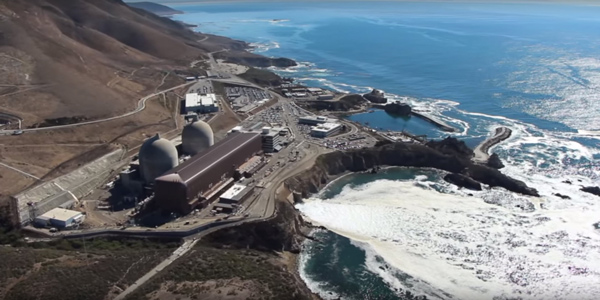By Hudson Sangree
SACRAMENTO, Calif. — A measure to replace generating capacity and limit economic disruption caused by the retirement of the state’s last nuclear power plant is headed to the desk of Gov. Jerry Brown.
Pacific Gas and Electric’s Diablo Canyon Power Plant, which sits on a scenic stretch of coastline south of Big Sur, generates nearly a tenth of California’s in-state power and 20% of the utility’s needs.
Senate Bill 1090, which passed the State Assembly by 67-1 on Aug. 20, would require Diablo Canyon’s output to be replaced with “a portfolio of greenhouse-gas-free resources,” the first measure of its kind in California.
The bill seeks to avoid a spike in emissions, which occurred after the San Onofre Nuclear Generating Station in Southern California closed in 2013 and fossil-fuel burning plants were brought online to compensate.
The measure directs the Public Utilities Commission to approve full funding for measures to lessen the impact on the local economy and to retain skilled workers until the plant is retired in 2025, when its last Nuclear Regulatory Commission operating license expires. The PUC approved PG&E’s application to retire the plant in January but balked at providing $85 million in community-impact funds and millions more for job retention and retraining, asking the legislature for guidance.
The bill, which cleared the State Senate 31-4 in May, was co-authored by Senate Majority Leader Bill Monning, a Democrat, and Assemblyman Jordan Cunningham, a Republican, both of whom represent districts surrounding Diablo Canyon.
“I am hopeful that Gov. Brown will also be supportive of the safe, reliable and carefully planned retirement of the Diablo Canyon Nuclear Power Plant and sign SB 1090,” Monning said in a statement. “The bill is imperative to the local economy, the state’s energy grid and the region.”
An agreement reached in 2016 among PG&E and environmental and labor groups initially laid out plans for the plant’s closure.
The Natural Resources Defense Council, which helped negotiate the agreement, lauded the bill’s passage.
“The package of policies included in SB 1090 offers a model for the phaseout of aging power plants with clean, increasingly less expensive energy while providing a just transition for workers and communities affected by the shutdown,” NRDC’s western energy director, Peter Miller, wrote in blog post Monday.
A spokeswoman for Monning said she had “no idea … one way or another” whether Brown will sign the bill.
Brown, who has until Sept. 30 to sign or veto the measure, declined to comment on his position. “We typically do not weigh in on pending legislation,” Deputy Press Secretary Brian Ferguson told RTO Insider.




